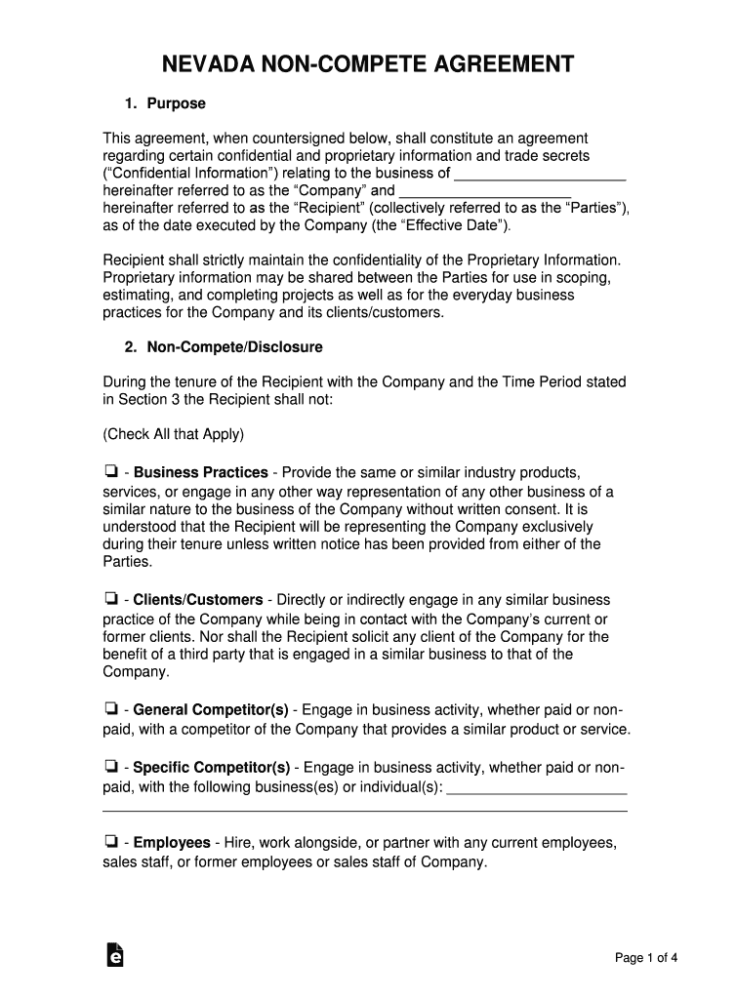Nevada Non-Compete Law: Key Legal Changes
Nevada’s non-compete law plays a vital role in the business landscape. These laws govern the agreements between employers and employees regarding post-employment restrictions. The aim is to protect businesses from unfair competition while balancing employees’ rights to seek new opportunities. Understanding these laws can help both employers and employees navigate their rights and responsibilities.
Understanding Non-Compete Agreements

A non-compete agreement is a legal contract between an employer and an employee that restricts the employee from engaging in similar work after leaving the company. Here are some key points to consider:
- Purpose: To prevent employees from using insider knowledge to benefit competitors.
- Duration: Agreements typically specify how long the restrictions apply.
- Geographic Scope: These agreements often limit the area where the employee can work.
Non-compete agreements vary widely in their terms and enforcement. It’s essential to ensure these agreements are reasonable and do not unduly restrict an employee’s ability to earn a living.
Recent Changes in Nevada Non-Compete Law

In recent years, Nevada has seen significant changes in its non-compete laws. Some of the most notable updates include:
- Increased Scrutiny: Courts are now examining non-compete agreements more closely, focusing on their fairness and necessity.
- Limitations on Duration: The law has imposed stricter limits on how long a non-compete can last, often favoring shorter durations.
- Geographical Limitations: There are now clearer guidelines on how broadly these agreements can restrict an employee’s ability to work.
- Industry-Specific Regulations: Certain industries may face additional scrutiny regarding the enforceability of these agreements.
These changes aim to create a more balanced approach that protects businesses without unfairly restricting employees. Staying informed about these developments is crucial for both employers and employees to ensure compliance and protect their rights.
Impact of Changes on Employers

The recent changes in Nevada’s non-compete laws significantly affect employers. These adjustments mean that businesses must rethink how they draft and implement non-compete agreements. Here are some impacts to consider:
- Revised Contract Language: Employers may need to alter the language in their contracts to ensure they comply with the new legal standards.
- Reduced Duration: With limitations on how long non-compete agreements can last, employers might find it harder to protect their interests over extended periods.
- Geographical Restrictions: Businesses must be cautious about the geographic scope of their agreements. Overly broad restrictions may lead to unenforceability.
- Increased Litigation Risk: As courts become more scrutinizing, employers may face a higher risk of legal challenges if their agreements are deemed unreasonable.
In light of these changes, it’s essential for employers to consult legal experts when drafting non-compete agreements. This ensures compliance and minimizes potential disputes while still protecting their business interests.
Impact of Changes on Employees
The recent adjustments to non-compete laws also benefit employees significantly. These changes promote a fairer work environment and provide more freedom in career choices. Here are some key impacts:
- Greater Job Mobility: With shorter duration limits, employees can seek new job opportunities sooner without facing legal hurdles.
- Clearer Rights: The changes have brought more clarity regarding what is enforceable, empowering employees to understand their rights better.
- Stronger Negotiation Power: Employees can negotiate better terms in their contracts, knowing that excessively restrictive agreements may not hold up in court.
- Protection from Retaliation: Employees who choose to leave for better opportunities can do so with less fear of facing legal repercussions.
Overall, these changes enhance employees’ rights and contribute to a more competitive job market, allowing individuals to pursue their career paths without unnecessary barriers.
Enforceability of Non-Compete Agreements
The enforceability of non-compete agreements in Nevada has come under increased scrutiny with recent legal changes. Understanding what makes these agreements enforceable is crucial for both employers and employees:
- Reasonableness: Agreements must be reasonable in scope, duration, and geography to be enforceable. Courts will evaluate whether the restrictions are necessary to protect legitimate business interests.
- Written Contracts: Non-compete agreements should be clearly documented and signed. Oral agreements are often difficult to enforce.
- Consideration: There must be valid consideration, such as a job offer or a promotion, in exchange for signing a non-compete agreement.
- State-Specific Laws: Non-compete agreements must adhere to Nevada’s specific laws and recent changes. Employers must stay updated to avoid unenforceability.
For an agreement to hold up in court, it’s vital that both parties fully understand their rights and obligations. Legal advice is recommended when drafting or signing non-compete agreements to ensure they are both fair and enforceable.
Legal Challenges and Considerations
Navigating the legal landscape of non-compete agreements can be tricky for both employers and employees. With recent changes in Nevada law, understanding potential legal challenges is crucial. Here are some common challenges and considerations to keep in mind:
- Ambiguity in Terms: Vague language can lead to disputes about what the agreement actually prohibits. It’s essential to use clear, specific language in any non-compete contract.
- Burden of Proof: The employer often bears the burden of proving that a non-compete agreement is reasonable and necessary for protecting legitimate business interests.
- Public Policy Considerations: Courts may refuse to enforce non-compete agreements that are overly restrictive or that go against public policy, particularly in industries where talent mobility is vital.
- Judicial Discretion: Judges have considerable discretion when evaluating non-compete agreements. This means outcomes can vary significantly depending on the circumstances of each case.
Before entering into or enforcing a non-compete agreement, both parties should seek legal counsel. This can help clarify rights and obligations, making it easier to navigate potential challenges down the line.
FAQs about Nevada Non-Compete Law
As you explore Nevada’s non-compete laws, you might have some questions. Here are some frequently asked questions that can help clarify common concerns:
- What is a non-compete agreement? It’s a contract that restricts an employee from working for a competitor after leaving a company.
- Are all non-compete agreements enforceable? No, only those that meet specific criteria regarding reasonableness in duration, geography, and scope.
- How long can a non-compete last in Nevada? Recent changes limit the duration to a shorter period, usually no longer than one to two years.
- What happens if I breach a non-compete agreement? Breaching an agreement can result in legal action, including potential financial penalties or injunctions.
- Can I negotiate my non-compete agreement? Yes, many employees can negotiate terms before signing, especially if they understand their rights.
Understanding these common questions can empower both employers and employees to navigate their rights and responsibilities more effectively.
Conclusion on Key Legal Changes
In conclusion, the recent changes to Nevada’s non-compete laws represent a significant shift in how these agreements are treated. For employers, this means re-evaluating how they draft and enforce non-compete contracts. For employees, it offers greater freedom and flexibility in their career choices. Here are some key takeaways:
- Increased Clarity: The changes bring more clarity to what constitutes an enforceable non-compete agreement.
- Fairness: Stricter regulations ensure that non-compete agreements are fair and reasonable, benefiting both parties.
- Legal Compliance: Staying updated on these changes is crucial for employers to avoid potential legal issues.
- Empowerment for Employees: Employees have more tools at their disposal to negotiate favorable terms.
Overall, these legal changes foster a more balanced business environment in Nevada, promoting both innovation and fair competition. Staying informed and seeking legal advice when necessary can help ensure that everyone navigates these changes successfully.


